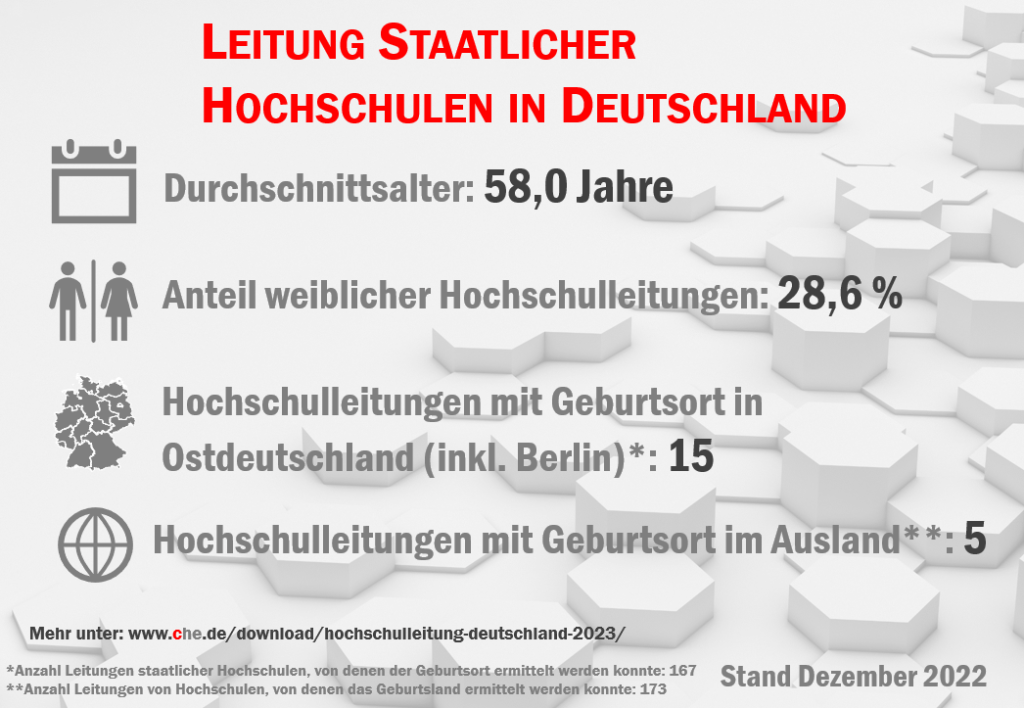 Foto: succo / Pixabay
Foto: succo / PixabayThe number of state-run higher education institutions (HEIs) led by a woman has increased significantly in recent years. Altogether, 52 out of 182 HEIs in Germany currently have a female rector or president. Leaders of eastern German origin continue to be a rarity, as are university heads from abroad. These are the findings of the annual evaluation carried out by the CHE Centre for Higher Education. The CVs of 182 incumbent presidents and rectors of German state-run HEIs were examined for this purpose.
Over a quarter of the heads of state-run HEIs in Germany are female. In December 2022, the proportion of women was 28.6 per cent, an increase of 3.7 percentage points compared to the last survey (December 2021). While the proportion of female leaders of state-run universities of applied sciences (UAS) declined slightly, it rose significantly at universities – from 27.5 to 37 per cent. Of the 14 people newly appointed to leadership positions at universities in 2022, 12 were women.
In contrast, university heads of foreign origin are few and far between. Only five of the incumbent leaders were found in the CHE evaluation to have been born outside of Germany. The federal state from which the most rectors or presidents originated (48 individuals) is North Rhine-Westphalia, followed by Bavaria (33 individuals). As of the cut-off date on 31 December 2022, 15 state-run HEIs were managed by leaders from eastern German states, including Berlin.
“Heads of HEIs in Germany are minimally younger compared to the previous year, and there has been a slight increase in the number of women. However, they continue to fail to reflect the heterogeneity of their students on campus in terms of their origins and educational biographies,” summarised Isabel Roessler, who led the study.
The average age of HEI leaders in Germany is currently 58 years; the youngest manager was born in 1982. The subjects of law, economics and social sciences dominate when it comes to the leaders’ backgrounds. About one third each, i.e. most leaders at both types of universities, have a degree in this subject area.
More than half of the current rectors and presidents took office within the past five years (from 2017). In 2022, there was a change of top management at 24 state-run HEIs.
“What is striking when analysing the CVs of university leaders is the high proportion of people who have made a long-term career within their HEI. Two-thirds of the current university heads and 70 per cent of UAS leaders were previously engaged at their respective HEI – for an average of 13 years,” stated the author of the CHECK Hochschulleitung in Deutschland (CHECK heads of higher education institutions in Germany).
HEADS OF STATE-RUN HEIs IN GERMANY

About the analysis:
The “CHECK Hochschulleitung in Deutschland – Update 2023” (CHECK heads of higher education institutions in Germany – Update 2023) provides updated data from the previous CV evaluations “CHECK Universitätsleitung in Deutschland” (CHECK heads of universities in Germany) and “CHECK HAW-Leitungen in Deutschland” (CHECK heads of universities of applied sciences in Germany). The CVs of 182 heads of state-run HEIs published on the internet were considered, alongside requests for information from presidential boards and rectorates. The cut-off date for the survey and update was 31 December 2022. All the above publications were written by Isabel Roessler. All the publication’s graphics are available on the CHE Flickr channel.
CHECK - Hochschulleitung in Deutschland - Update 2023 2. May 2023 1.22 MB 8083 downloads
Roessler, Isabel: CHECK - Hochschulleitung in Deutschland - Update 2023, Gütersloh,...
Bildquelle: Pixabay
